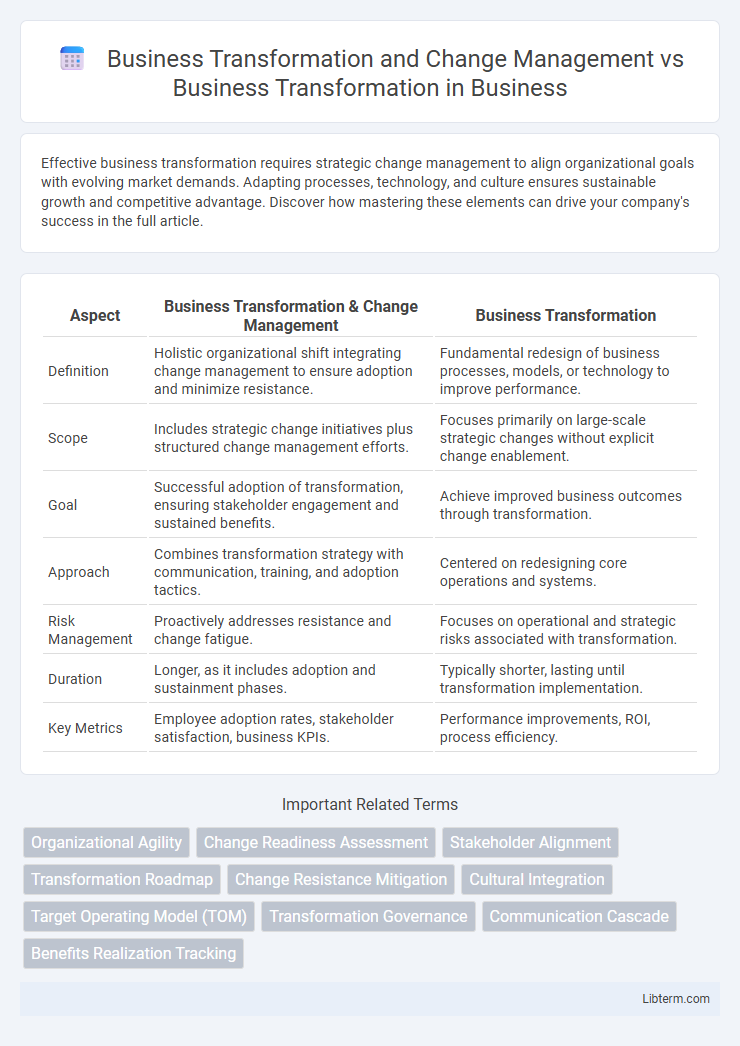Effective business transformation requires strategic change management to align organizational goals with evolving market demands. Adapting processes, technology, and culture ensures sustainable growth and competitive advantage. Discover how mastering these elements can drive your company's success in the full article.
Table of Comparison
| Aspect | Business Transformation & Change Management | Business Transformation |
|---|---|---|
| Definition | Holistic organizational shift integrating change management to ensure adoption and minimize resistance. | Fundamental redesign of business processes, models, or technology to improve performance. |
| Scope | Includes strategic change initiatives plus structured change management efforts. | Focuses primarily on large-scale strategic changes without explicit change enablement. |
| Goal | Successful adoption of transformation, ensuring stakeholder engagement and sustained benefits. | Achieve improved business outcomes through transformation. |
| Approach | Combines transformation strategy with communication, training, and adoption tactics. | Centered on redesigning core operations and systems. |
| Risk Management | Proactively addresses resistance and change fatigue. | Focuses on operational and strategic risks associated with transformation. |
| Duration | Longer, as it includes adoption and sustainment phases. | Typically shorter, lasting until transformation implementation. |
| Key Metrics | Employee adoption rates, stakeholder satisfaction, business KPIs. | Performance improvements, ROI, process efficiency. |
Understanding Business Transformation: An Overview
Business transformation involves comprehensive changes to an organization's operations, strategy, and culture aimed at achieving significant performance improvements and market adaptability. Change management focuses on the structured approach to transitioning individuals, teams, and processes to new states, ensuring successful implementation of transformation initiatives. Understanding business transformation requires recognizing it as a strategic, organization-wide effort that integrates change management to drive sustainable growth and innovation.
Defining Change Management in the Business Context
Change management in the business context refers to structured approaches and processes designed to help organizations transition from current states to desired future states while minimizing disruption. It focuses on managing the human, cultural, and operational aspects of transformation initiatives to ensure successful adoption and sustained change. Business transformation encompasses broader strategic shifts, whereas change management specifically addresses the methods and practices that facilitate smooth implementation of these transformations.
Business Transformation vs Change Management: Key Differences
Business transformation involves a comprehensive overhaul of an organization's processes, strategies, and technologies to achieve significant growth and competitive advantage, whereas change management focuses on guiding individuals and teams through the transition to ensure smooth adoption of specific changes. Key differences include scope, with business transformation addressing end-to-end systemic shifts, compared to change management's emphasis on the human and behavioral aspects of change. Business transformation requires strategic vision and structural realignment, while change management provides the frameworks and tools to manage resistance, communication, and training throughout the transformation journey.
The Interconnection Between Business Transformation and Change Management
Business Transformation and Change Management are intrinsically linked, with Change Management providing the structured approach necessary to implement Business Transformation initiatives effectively. Business Transformation involves fundamental shifts in organizational processes, technology, and culture, while Change Management ensures employee adoption, minimizes resistance, and sustains transformation outcomes. The interconnection lies in Change Management's role as the catalyst that bridges strategic Business Transformation goals with practical execution and lasting organizational change.
Core Components of Successful Business Transformation
Business transformation centers on reshaping organizational strategies, processes, and technologies to achieve long-term growth, while change management focuses on guiding employees and stakeholders through the transition smoothly. Core components of successful business transformation include a clear vision, leadership commitment, agile processes, effective communication, and employee engagement to drive adoption and sustain change. Implementing data-driven decision-making and continuous monitoring ensures alignment with business goals and adaptability throughout the transformation journey.
Role of Leadership in Driving Transformation and Change
Effective business transformation relies heavily on leadership's ability to drive change by setting a clear vision, aligning stakeholders, and fostering a culture of innovation and agility. Change management is integral to transformation, with leaders orchestrating communication strategies, managing resistance, and ensuring employee engagement throughout the transition. Strong leadership accelerates business transformation by embedding change into organizational processes and reinforcing accountability for sustained success.
Change Management Strategies within Business Transformation Initiatives
Change management strategies integral to business transformation initiatives focus on guiding organizational change through structured communication, stakeholder engagement, and training programs that ensure employee adoption and minimize resistance. Embedding change management within business transformation enhances project success by aligning business processes, technology, and culture with strategic objectives. Effective change management frameworks such as ADKAR or Kotter's 8-Step model provide measurable outcomes by addressing people-centric challenges during transformation.
Measuring the Impact of Transformation and Change
Measuring the impact of Business Transformation and Change Management requires distinct metrics to evaluate both overall transformation outcomes and the effectiveness of change initiatives. Business Transformation focuses on key performance indicators such as revenue growth, operational efficiency, and market share expansion, while Change Management emphasizes employee adoption rates, stakeholder engagement levels, and resistance reduction. Integrating these measurement frameworks ensures a comprehensive assessment of transformation success and organizational adaptability.
Common Challenges in Business Transformation and Change Management
Common challenges in Business Transformation and Change Management include resistance to change, communication gaps, and lack of stakeholder engagement, which can hinder successful project implementation. Aligning organizational culture with new business processes and managing employee expectations are critical yet difficult steps for sustaining transformation outcomes. Failure to address these challenges often leads to project delays, increased costs, and reduced ROI in business transformation initiatives.
Future Trends in Business Transformation and Change Management
Future trends in Business Transformation and Change Management emphasize agile methodologies, digital integration, and employee-centric approaches to drive sustained organizational change. Leveraging AI and data analytics enhances decision-making and customization of transformation initiatives, improving adaptability in dynamic markets. Organizations prioritizing continuous learning and innovation position themselves for long-term success amid evolving technological and market landscapes.
Business Transformation and Change Management Infographic

 libterm.com
libterm.com